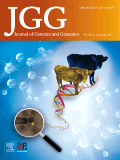
Journal of Genetics and Genomics
Scope & Guideline
Exploring the Frontiers of Genetic Science
Introduction
Aims and Scopes
- Genomic and Genetic Mechanisms:
Research focusing on the underlying genomic and genetic mechanisms influencing various biological processes, including gene regulation, mutation effects, and genetic diversity among species. - Model Organisms and Developmental Biology:
Utilization of model organisms, particularly zebrafish and other species, to study developmental processes, gene function, and disease models, offering insights into the genetic basis of developmental biology. - Agricultural Genomics:
Investigation into the genetic factors that contribute to agronomic traits and crop improvement, including studies on stress resistance, yield, and quality traits in various crops. - Translational Research and Genetic Disease:
Exploration of genetic disorders through translational research, involving the identification of genetic variants associated with diseases and the development of gene therapies and interventions. - Epigenetics and Environmental Interactions:
Research examining the role of epigenetic modifications and environmental factors in gene expression and phenotypic variation, providing insights into complex trait inheritance. - Bioinformatics and Computational Genomics:
Development and application of bioinformatics tools and computational methods for analyzing genomic data, facilitating insights into genetic variation and functional genomics.
Trending and Emerging
- Single-Cell Genomics:
There is a growing emphasis on single-cell genomic technologies, which allow for the detailed analysis of cellular heterogeneity and lineage tracing, particularly in developmental biology and disease contexts. - CRISPR and Genome Editing Technologies:
Research on CRISPR and other genome editing technologies is rapidly expanding, with studies focusing on their applications in gene therapy, functional genomics, and crop improvement. - Microbiome and Host Interactions:
An increasing number of studies are investigating the interactions between host genetics and microbiome composition, emphasizing the role of microbial communities in health and disease. - Transgenerational Epigenetic Inheritance:
Emerging research is focused on understanding transgenerational epigenetic effects, exploring how environmental factors can influence gene expression across generations. - Integrative Multi-Omics Approaches:
There is a trend towards integrating multiple omics technologies (genomics, transcriptomics, proteomics) to provide a holistic understanding of biological systems and complex traits. - Artificial Intelligence in Genomics:
The application of artificial intelligence and machine learning techniques for genomic data analysis is on the rise, enhancing the ability to predict genetic outcomes and identify potential therapeutic targets.
Declining or Waning
- Classical Genetic Mapping Studies:
There has been a noticeable decrease in traditional genetic mapping studies focused on simple trait analysis, as new high-throughput sequencing technologies and genomic approaches provide more comprehensive insights. - Single Trait Focus in Agricultural Studies:
Research that concentrates solely on individual traits in agricultural genomics is declining, with a shift towards multi-trait and systems biology approaches that consider the interactions between multiple genetic factors. - Basic Molecular Genetics:
The focus on basic molecular genetics has waned as the field increasingly prioritizes integrative approaches that combine genomics, transcriptomics, and proteomics to understand complex biological systems. - Phenotypic Plasticity Studies:
Studies specifically targeting phenotypic plasticity through classical genetics have become less common, as researchers now emphasize genomic and epigenomic contributions to phenotypic variation. - Historical Genetic Studies:
Research focused on historical genetic variations and ancient DNA has diminished, possibly due to the challenges associated with sample availability and the rise of contemporary genetic studies.
Similar Journals

International Journal of Genomics
Empowering discoveries through open-access scholarship.International Journal of Genomics is a pivotal open-access publication under the esteemed HINDAWI LTD, dedicated to advancing the fields of genomics, biochemistry, genetics, and molecular biology. Established in 2013, this journal aims to disseminate innovative research findings and foster scholarly dialogue among researchers, professionals, and students alike. With a robust Impact Factor reflective of its commitment to quality, the journal has achieved a Q3 ranking in Biochemistry, Genetics, and Molecular Biology, as well as notable placements in Pharmaceutical Science, indicating its broad relevance and influence in these interconnected fields. The journal is indexed in esteemed databases, ensuring high visibility and accessibility for published works. As an open-access journal, it prioritizes the sharing of knowledge across borders, facilitating greater collaboration and advancement in genomic research globally. Join the academic community in exploring the vast potential of genomics through the International Journal of Genomics, based in Egypt, and reaching audiences worldwide from its London office.

Human Genomics
Elevating Genomic Research to New HeightsHuman Genomics, published by BMC, is a leading open-access journal dedicated to advancing the field of genomics and its applications in health and disease. Since its inception in 2003, the journal has provided a vital platform for researchers to disseminate groundbreaking findings related to genetic research, contributing significantly to areas such as Drug Discovery, Genetics, Molecular Biology, and Molecular Medicine, as reflected in its Q1 and Q2 quartile rankings throughout 2023. With an ISSN of 1473-9542 and an E-ISSN of 1479-7364, Human Genomics not only delivers high-quality, peer-reviewed research but also ensures accessibility to a broader audience, empowering professionals, students, and academics to stay at the forefront of genomic science. Through its rigorous editorial standards and impactful publications, the journal fosters a collaborative environment for innovative research across the globe from its base in the United Kingdom. By promoting open access since its launch, Human Genomics continues to enhance the visibility and impact of genetic studies, making it an essential resource for anyone involved in the rapidly evolving field of human genomics.

Genes & Genomics
Bridging Science and Innovation in Genetic StudiesGenes & Genomics is a prominent academic journal dedicated to the fields of biochemistry, genetics, and molecular biology, published by Springer from South Korea. With an evolving focus on innovative genetic research and its implications, this journal serves as a crucial platform for disseminating knowledge within the scientific community. The journal has been indexed in Scopus and boasts a Q3 quartile ranking in 2023 for its contributions to these disciplines, highlighting its relevance and growing impact. In addition to traditional subscription options, Genes & Genomics supports Open Access, offering broader accessibility for researchers and enthusiasts eager to explore the latest advancements in genetic studies. Since its inception in 2008, the journal has committed to publishing high-quality research that drives forward our understanding of genetics and its applications, making it an essential resource for researchers, professionals, and students alike who are passionate about the complexities and breakthroughs in genomic sciences.

Evolutionary Bioinformatics
Empowering discoveries in ecology, evolution, and genetics.Evolutionary Bioinformatics, published by SAGE Publications Ltd, is a pioneering open-access journal established in 2005, dedicated to advancing the field of evolutionary biology through innovative computational techniques and bioinformatics. With an ISSN of 1176-9343, it serves as a critical platform for researchers, professionals, and students to disseminate impactful findings and foster collaboration across disciplines. The journal spans a broad scope, contributing significantly to the areas of Ecology, Evolution, Behavior and Systematics, and Genetics, as evidenced by its respectable Scopus rankings and quartile placements in 2023. With a commitment to providing comprehensive, peer-reviewed research articles and tools for sharing knowledge, Evolutionary Bioinformatics plays an essential role in shaping the future of evolutionary studies and bioinformatics. Readers and contributors alike are encouraged to engage with cutting-edge research that pushes the boundaries of understanding in this dynamic field.

BIOCHEMICAL GENETICS
Advancing the Frontier of Biochemical InsightsBIOCHEMICAL GENETICS, published by Springer/Plenum Publishers, is a prominent journal in the fields of biochemistry, genetics, and molecular biology, with a substantial impact on the scientific community since its inception in 1967. The journal holds a significant position within various academic quartiles, ranking Q2 in Ecology, Evolution, Behavior and Systematics, and Q3 in Biochemistry, Genetics, and Medicine (miscellaneous), among others, demonstrating its diverse and interdisciplinary reach. With an ISSN of 0006-2928 and an E-ISSN of 1573-4927, it is recognized for contributing critical research insights and methodologies that drive the fields of biochemical genetics forward. Although it is not an Open Access journal, it provides vital access options and resources for researchers globally, facilitating the dissemination of knowledge across institutions. Positioned within the competitive landscape of Scopus rankings, it maintains respectable standings across its focused areas, making it an invaluable resource for researchers, professionals, and students seeking to deepen their understanding of genetic mechanisms and biochemical processes.

Genetics Research
Driving Progress in Genetic and Medical SciencesGenetics Research, published by HINDAWI LTD, is a distinguished open access journal that has been at the forefront of genetic studies since its inception in 1960. With the transition to open access in 2019, this journal has expanded its accessibility, fostering knowledge dissemination across the global scientific community. Operating out of the United Kingdom, it provides a platform for innovative research in the fields of genetics and molecular biology, encompassing a broad range of topics that are highly relevant to medical sciences. As of 2023, it holds a Q4 classification in Genetics and a Q3 classification in miscellaneous Medicine, reflecting its ongoing commitment to scholarly excellence amidst shifting academic landscapes. While the journal's H-index remains unlisted, its indexed ranking within Scopus, with a rank of #325/328 in the Genetics category highlights the challenges ligated to its niche audience. Nevertheless, it serves as a crucial resource for researchers, professionals, and students eager to contribute to and stay informed on the latest genetic research trends and breakthroughs.

Frontiers in Genetics
Connecting Researchers to the Future of GeneticsFrontiers in Genetics is a premier academic journal dedicated to advancing the field of genetics through high-quality, peer-reviewed research. Published by FRONTIERS MEDIA SA in Switzerland since 2010, this Open Access journal provides a platform for researchers and practitioners to disseminate innovative findings across various subfields, including clinical genetics and molecular medicine. With a notable emphasis on interdisciplinary approaches, the journal holds a strong position in the academic landscape, achieving Q2 rankings in key categories such as Genetics and Molecular Medicine in 2023. Not only does Frontiers in Genetics contribute to the scholarly dialogue by publishing impactful studies, but it also promotes accessibility to vital research, ensuring that knowledge is available to a global audience. This journal is a vital resource for researchers, professionals, and students looking to stay at the forefront of genetic discoveries and their applications, reflective of its engagement with contemporary challenges in genetics and healthcare.

PLoS Genetics
Fostering global collaboration in the realm of genetics and molecular biology.PLoS Genetics, published by the PUBLIC LIBRARY SCIENCE, is a leading open-access journal dedicated to advancing the field of genetics, molecular biology, and related disciplines. With its ISSN of 1553-7404, this esteemed journal has been offering unrestricted access to its content since 2005, fostering a global community of researchers, professionals, and students. Situated in the United States, its contributions can be found at 1160 Battery Street, Ste 100, San Francisco, CA 94111. As of 2023, PLoS Genetics proudly holds a Q1 ranking in multiple categories including Cancer Research, Ecology, Evolution, Behavior and Systematics, Genetics, and Molecular Biology, underscoring its impact in these vital scientific areas. The journal's commitment to disseminating high-quality research is reflected in its impressive Scopus rankings, with notable positions in various fields of study, ensuring that it remains a crucial resource for cutting-edge research and innovation. By providing an open-access platform, PLoS Genetics not only enhances the visibility of genetic research but also encourages collaborations and the sharing of knowledge that can lead to significant breakthroughs in science.

HUMAN MOLECULAR GENETICS
Illuminating the path of molecular genetics discovery.HUMAN MOLECULAR GENETICS, published by Oxford University Press, is a premier journal in the field of genetics, with an established reputation since its inception in 1992. With an impressive Q1 ranking in various categories, including Genetics, Clinical Genetics, and Molecular Biology, this journal engages a diverse readership by reporting significant advances in our understanding of the genetic basis of human health and disease. The journal has achieved notable rankings within Scopus, particularly in Clinical Genetics, making it a key resource for professionals and researchers aiming to stay at the forefront of genetic research. Although it operates under a traditional access model, it remains committed to disseminating high-quality research that informs clinical practice and enhances knowledge in the genetic field. The journal's impact factor signifies its crucial role in shaping contemporary genetic research and its application in medicine. As the field continues to evolve, HUMAN MOLECULAR GENETICS serves not only as an academic repository but also as a vital platform for innovation and discussion among students, researchers, and clinicians.

CURRENT GENETICS
Unveiling the Future of GeneticsCURRENT GENETICS is a prestigious journal published by SPRINGER, dedicated to advancing the field of genetics through the dissemination of high-quality research. With a notable impact factor and ranking in the Q2 category for both Genetics and Medicine (miscellaneous) as of 2023, it firmly establishes itself as a significant resource for the academic community. The journal’s comprehensive scope explores the latest findings in genetic research, along with accompanying interdisciplinary studies, providing a platform for researchers to share innovative ideas and methodologies. ISSN: 0172-8083, E-ISSN: 1432-0983, stands testament to its commitment to scholarly excellence. While Open Access options are not currently available, CURRENT GENETICS remains accessible to a broad audience, promoting a rich exchange of knowledge that supports the vast and evolving discipline of genetics. Since its inception in 1979 and through its converged years till 2024, this journal has played a crucial role in confronting scientific challenges and promoting advancements in genomic medicine and molecular biology. As such, it is an essential read for researchers, professionals, and students keen to remain at the forefront of genetic research.